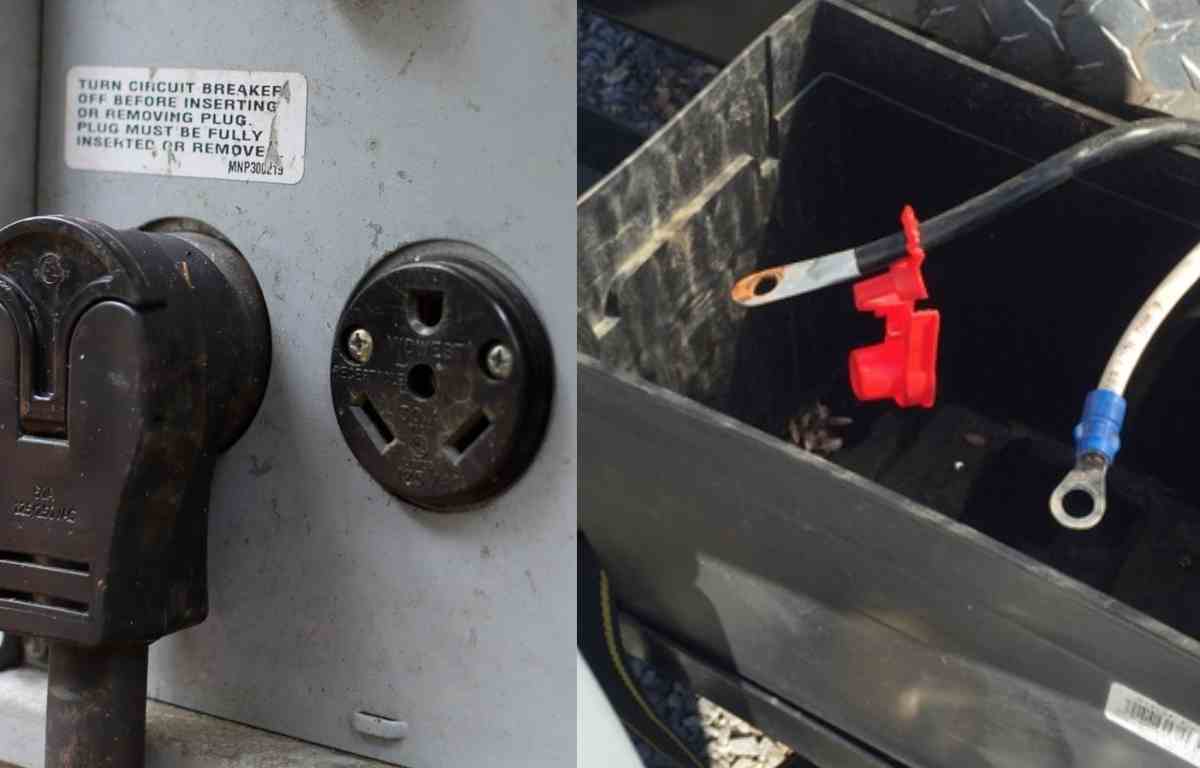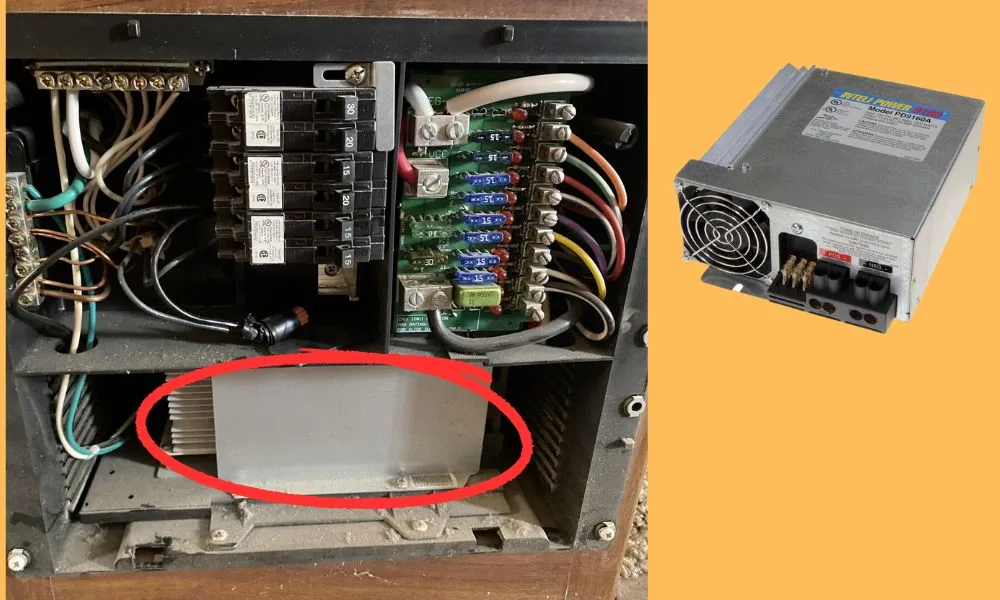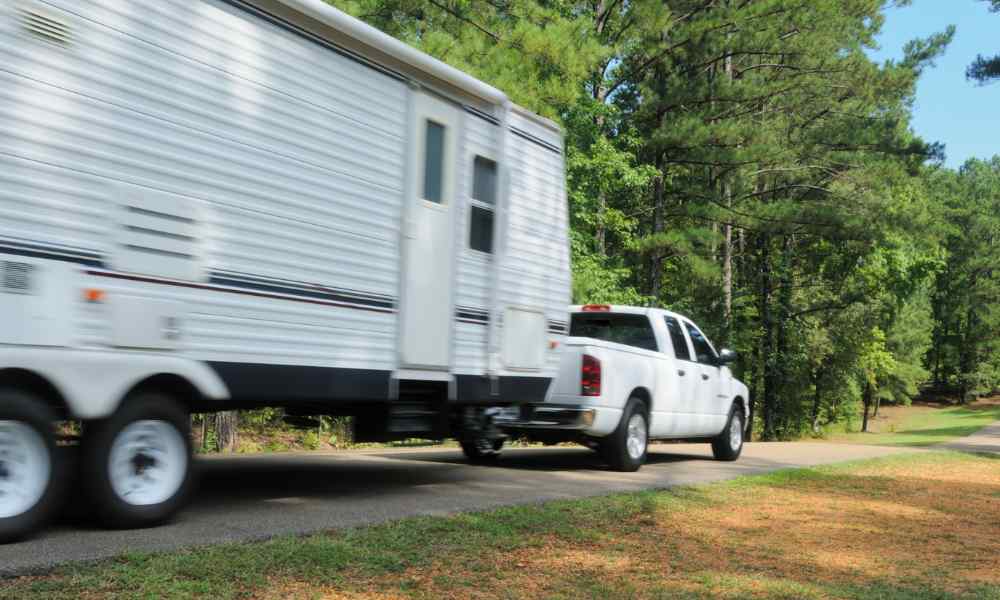If you’re wondering if your RV converter will work without an RV battery connected and when connected to an external power source, the short answer is yes. However, there are some safety considerations you must be aware of when operating your RV like this. For various reasons, you may need to operate your RV without a battery when it’s plugged into shore power. Since most RVs operate on both 120V (AC) electricity and 12V (DC) power, you’ll most likely have a converter that will allow you to operate both 12V and 120V components on shore power.

The converter’s job is to convert 120-volt AC power into DC power, which is required by some of your RV components. This includes RV components like lights, power awnings and slides, furnace fans, power leveling jacks, your RV water pump, and electrical components of some propane appliances like an RV refrigerator and water heater. When not plugged in, these components will rely on the battery power to operate.
Another important job of the converter is the keep your battery charged. In addition to providing direct current to the appliances, it will send current to the battery to keep it topped off. When you disconnect from the grid, a charged battery will reverse the flow of current to supply the 12V appliances and components of the RV. The RV’s electrical system is a fairly simple setup that allows campers to enjoy the benefit of on and off-grid living.
Newer converters will usually have smart features that will stop charging the battery when it has a full charge. However, if no battery is present, it may still try to charge a nonexistent battery. You can have live wires at the battery terminal wires.
What are the dangers of operating without an RV Battery?
The most important thing to remember when operating your RV on shore power, without a battery installed, is that the converter will still send current through the battery wires, as it would if one was installed. Your RV power converter is also a battery charger. If your battery is not connected, the 12V wires may have live current running through them, attempting to charge the nonexistent battery. If these wires touch metal components, such as the frame of the RV, it could create a dangerous situation. It’s always a good idea to tape off the wires with electrical tape.
If your RV has a battery disconnect switch, you should turn it off whenever there isn’t a battery connected. This will additionally prevent the converter from sending current to the battery, cutting it off at the switch. However, always ensure your switch is functioning properly, as it can provide a false sense of security if it’s damaged or set incorrectly. You should additionally tape off the wires as the disconnect switch typically only breaks the circuit but may still have power flowing through your positive wire.
Why would you need to operate your RV without a battery?
It’s always best to operate your RV with a battery installed. Not only will this prevent safety issues, but it will also prolong the life you’re your Converter. However, there may be several reasons why you need to power your RV through shore power without a battery installed.
One of the main reasons is when you need to replace your battery. If you have a malfunctioning battery or are performing maintenance on it, you may need to temporarily remove your battery. You should never service your battery while connected to your RV.
Another reason RV owners may run their RV without a battery is when their RV is in storage. A common and wise practice when winterizing your RV is to remove the battery. This prolongs the life of your battery and prevents damage from harsh conditions. However, depending on where you store your RV, you may find the need to plug in and temporarily power it without the battery. If doing so, always make sure your battery wires are properly taped and/or the battery disconnect switch is turned off.
Does operating your RV without a battery damage the converter?
Operating an RV without a battery can potentially damage the converter. The converter in an RV transforms 120-volt AC power from shore power or a generator into 12-v DC power to run the RV’s 12-volt appliances and to charge the RV’s batteries. The battery plays a crucial role in this system, acting as a buffer and helping to stabilize the voltage in the 12-volt system.
Without a battery in place, the converter has to work harder to maintain a stable voltage output, which can lead to overheating and eventually damage the converter over time. The absence of a battery also means that any spikes or fluctuations in the power supply could directly affect the 12-volt appliances and lighting in the RV, potentially causing damage or reducing their lifespan.
Operating for short periods of time, such as when swapping out a battery, won’t have any lasting effects on the converter. However, if you do this for long periods, usage under this setup will likely reduce the lifespan of the converter.
Can you operate an RV with a bad battery?
Perhaps you have a battery that won’t hold a charge. Assuming there is no physical damage to the battery, operating off of AC power when plugged will work just fine. However, it’s always advisable to inspect your battery for budging, leaks, or corrosion. A damaged battery can be dangerous and should be replaced.

Why is an RV battery needed if you have a converter?
An RV battery plays a critical role in stabilizing the electrical system and ensuring a consistent power supply for 12-volt appliances and systems, even when not connected to shore power or a generator. The battery acts as a buffer, absorbing voltage fluctuations and providing surge support for high-demand appliances, protecting sensitive electronics and extending their lifespan. Without a battery, the converter would bear the brunt of these demands, potentially leading to overheating and damage over time.
Having an RV battery enhances the flexibility and reliability of your travel experience, enabling off-grid camping and providing a backup power supply during outages. It ensures that essential systems like lighting and water pumps remain operational, contributing to a safer and more comfortable environment. Furthermore, a battery setup allows for easy integration of renewable energy sources, like solar panels, making it a sustainable choice for travel.
In summary, while a converter is capable of supplying 12-volt power, an RV battery is indispensable for voltage stabilization, uninterrupted power supply, and the overall longevity of the electrical system. It supports a range of camping styles, from dry camping to staying in fully-equipped RV parks, ensuring that your RV is ready for any adventure.
Towing without a battery?
Towing an RV, such as a travel trailer or fifth wheel, without a battery is technically possible, but it is not recommended due to significant safety concerns and potential legal violations. Many RVs rely on a battery to operate essential safety features, such as the electric brakes and breakaway switch, which bring the trailer to a halt in case of a detachment from the tow vehicle. Furthermore, the RV’s running lights, brake lights, and turn signals, essential for safe driving and communication with other drivers, may not function properly without a battery.

While specific towing laws vary by location, most regions require functional lighting and safety systems on trailers, necessitating a working battery. Towing without meeting these legal requirements could result in fines and increased liability in case of an accident. Additionally, without a battery, you lose access to the 12-v battery system and appliances in the RV until connected to an external source such as shore power or a generator, limiting functionality.
What RV appliances and components run off 12-volt DC power?
RVs have a 12-volt electrical system in addition to a 120-volt system, allowing certain appliances and components to run off the vehicle’s battery or a solar power system while you’re on the road or boondocking. Here’s a list of common RV appliances and components that typically run off 12-volt power:
- Lighting: Many RVs use 12-volt LED lights for interior and exterior lighting.
- Water Pump: The RV water pump, which supplies water from the onboard tank to the faucets and shower, usually operates on 12-volt power.
- Ventilation Fans: Roof vents and other ventilation fans in the RV are often 12-volt.
- Refrigerator: An RV fridge can often run on 12-volt power, although they may also have the option to run on 120-volt power or propane.
- RV Furnace: The furnace blower motor in an RV typically runs on 12-volt power, though the heating element itself may use propane.
- CO and Smoke Detectors: Carbon monoxide detectors and smoke detectors in RVs are often powered by 12-volt RV batteries.
- USB Chargers and 12-Volt Outlets: Many RVs have USB ports and 12-volt outlets (similar to cigarette lighter outlets in cars) for charging phones and other devices.
- Control Panels: The control panels for monitoring tank levels, battery charge, and other systems in the RV typically run on 12-volt power.
- Awning: Power awnings can be operated using the RV’s 12-volt system.
- Slide-Outs: The motors that operate slide-out sections of the RV often run on 12-volt power.
- Television: Some smaller TVs designed for RV use can run on 12-volt power.
- Stereo and Entertainment Systems: Many RV entertainment systems are designed to run off 12-volt power.
- Water Heater Ignition: While the water heater in an RV might run on propane or 120-volt power, the ignition system for lighting the propane is typically 12-volt.
- Thermostat: The thermostat for controlling the RV’s heating and cooling systems usually runs on 12-volt power.
- Tank Heaters: Some RVs have tank heaters to prevent the water tanks from freezing in cold weather, and these can run on 12-volt power.
- Security Systems: If the RV is equipped with a security system, it may run on 12-volt power.
- Fresh Water Level Sensors: The sensors used to monitor the level of fresh water in the RV’s tank are typically powered by 12-volt.
What RV appliances and components run off 120-v AC Power
RVs usually have a 120-volt AC electrical system in addition to the 12-volt DC system, allowing you to use standard household appliances when connected to shore power or running a generator. Below is a list of common RV appliances and components that typically run off 120-volt AC power:
- Air Conditioner: The air conditioner is one of the most power-hungry appliances in an RV and typically requires 120-volt AC power to operate.
- Microwave Oven: Most RV microwaves run on 120-volt AC power.
- Refrigerator: Many RV refrigerators can run on 120-volt AC power, although they may also have the option to run on 12-volt DC power or propane.
- Electric Water Heater: Some water heaters in RVs run on 120-volt AC power, though they may also have a propane option.
- Television: Larger TVs and those not specifically designed for RV use typically require 120-volt AC power.
- Plug-in appliances: Vacuum Cleaner, Hair Dryer, Space Heater, Toaster Oven, Blender, Coffee Maker, etc.
- Charger for House Batteries: The charger that keeps the RV’s house batteries topped up when connected to shore power runs on 120-volt AC.
- Electric Grill/BBQ: Some portable electric grills and BBQs designed for RV use run on 120-volt AC power.
- Electric Fireplace: Some RVs come equipped with electric fireplaces that run on 120-volt AC power.
- Washing Machine: If the RV is equipped with a washing machine, it will likely require 120-volt AC power.
- Dryer: Like the washing machine, a dryer in an RV will require 120-volt AC power.
- Dishwasher: Though not common in all RVs, those that have dishwashers will require 120-volt AC power.
What is the difference between RV converters and RV inverters?
RV converters and inverters are integral components of an RV’s electrical system, serving distinct functions related to power conversion. An RV converter takes 120-volt AC power from an external source like shore power or a generator and converts it into 12-volt DC power, which is essential for running the RV’s onboard 12-volt appliances, lighting, and charging the house batteries. This device ensures that whenever the RV is hooked up to an external AC power source, the 12-volt systems are powered, and the batteries are charged and ready for use.
On the other hand, an RV inverter serves the opposite purpose, converting 12-volt DC power from the RV’s batteries into 120-volt AC power. This conversion is crucial when the RV is not connected to an external power source, allowing for the use of standard household appliances and outlets inside the RV. The inverter ensures that even in remote locations, away from traditional power sources, RVers can still enjoy the comforts of home, powering everything from microwaves to laptops. In summary, while the converter is essential for charging and maintaining the RV’s 12-volt systems when connected to AC power, the inverter provides AC power from the batteries when off-grid or away from external power sources.

